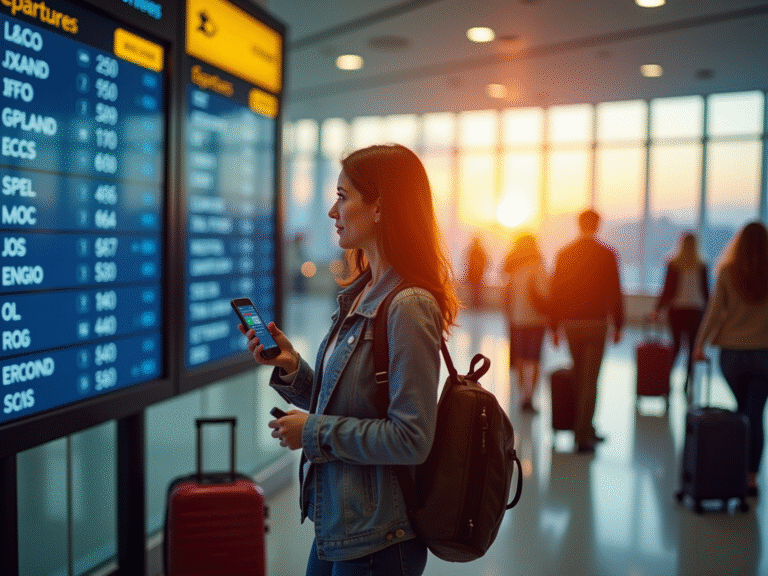Overview
To snag the best deals on airline tickets, you’ll want to book your local flights about one to three months in advance and your international flights three to six months ahead. Trust me, this little tip can make a big difference! As departure dates get closer, fare prices tend to rise, and nobody wants to pay more than they need to, especially during those busy travel seasons. So, by booking early, you can dodge those pesky price hikes and set yourself up for an exciting adventure!
Key Highlights:
- For local trips, it’s best to book airline tickets one to three months in advance to secure lower fares.
- For international travel, aim to book three to six months ahead to avoid price hikes as departure dates approach.
- Flying mid-week can save travelers up to 13% compared to weekend flights.
- Airfare typically increases by 30% during peak travel seasons and holidays, while off-peak travel can reduce costs by up to 25%.
- Shoulder seasons offer lower airfare with pleasant weather, making them ideal for budget-conscious travelers.
- Using fare alerts and tracking tools can help save an average of 25% on tickets.
- Flexibility with travel dates can lead to significant savings, as prices can vary greatly depending on the day.
- Subscribing to airline newsletters can provide access to exclusive offers and promotions.
- Traveling on the actual holiday can sometimes be cheaper, as demand drops on that day.
Introduction
Navigating the world of air travel can often feel like a complex puzzle, right? Especially when it comes to securing the best fares! With prices that fluctuate based on booking windows, seasonal trends, and special events, you really need to be savvy and strategic to maximize your savings. Understanding when to book domestic versus international flights, using online tools for price tracking, and recognizing the impact of peak travel seasons can significantly enhance your travel experience. This guide is packed with insights and practical strategies for you to explore the intricacies of airfare pricing. Get ready to save money and enjoy a richer journey!
Identify the Ideal Booking Window for Airline Tickets
To snag the best deals on airline tickets how far in advance to buy, it’s super important to understand the ideal booking window! For local trips, it’s important to know airline tickets how far in advance to buy, which is typically one to three months. This sweet spot lets you take advantage of lower fares before they start creeping up as your departure date approaches. Now, if you’re planning an overseas adventure, it’s generally best to understand airline tickets how far in advance to buy, which is typically three to six months ahead. This proactive approach helps you dodge those hefty price hikes that often come with last-minute bookings when seats get scarce.
Airlines are always adjusting their prices based on demand, so keeping an eye on fares during these windows is essential. Did you know that you can save up to 13% by flying mid-week instead of on the weekends? That’s right! Average airfares can be about 12% lower than those peak Sunday rates, according to industry experts. Plus, savvy travelers can make the most of credit card rewards and points to offset soaring travel costs, with some even managing to secure flights for just a fraction of the price, as highlighted in the case study ‘Maximizing Travel Rewards for Savings.’
By planning ahead and staying informed about pricing trends—like how prices can vary by route—you can really enhance your travel experience while keeping your budget in check. And if you spot a great rate early on, don’t hesitate to book it! Often, you can rebook for airline credit if prices drop later. Happy travels!
Understand Seasonal Trends and Their Impact on Airfare
Airfare charges can really fluctuate with the seasons! You’ll often find that flights cost more during peak travel times like summer and major holidays. In fact, you might spend an average of 30% more during these busy periods compared to those quieter off-peak times. But here’s the good news: traveling during off-peak seasons, like late fall or early spring, can lead to some fantastic savings—often lowering ticket costs by as much as 25%!
And let’s not forget about those shoulder seasons—those sweet spots just before or after peak times. They’re perfect for budget-conscious travelers like you! Airfare tends to be lower during these periods, yet you can still enjoy pleasant weather. For instance, if you visit the Maldives right before the rainy season, you could see significant drops in hotel prices, making your trip even more affordable.
To make the most of your travel planning, consider using fare alerts and cost tracking tools. A little insider tip: a case study shows that folks who utilize these resources can save an average of 25% on tickets! That really takes the stress out of keeping an eye on those fluctuating prices.
Also, keep in mind that Southwest Airlines has started charging for checked bags for flights booked on or after May 28. So, as you budget for your trips, be sure to factor in these additional costs! Travel analysts really emphasize understanding seasonal trends to help travelers decide on airline tickets how far in advance to buy. They’ve noticed that when considering airline tickets how far in advance to buy, planning your trips during off-peak times not only saves you money but also allows for a more relaxed experience, letting you connect more deeply with local cultures.
And here’s a fun idea to enhance your journey experience: why not incorporate local cultural elements into your photography? Late spring and early autumn are fantastic for capturing stunning shots with fewer tourists around. Just a heads up—most national parks require permits for professional photography, so it’s wise to check local regulations and secure those permits ahead of time. You could even wear traditional attire or include local symbols and landmarks in your photos for that unique touch! Props like balloons, bicycles, or even your pet can add a personal flair to your shots, making them truly memorable. As Zoey Peregrine says, “This win-win situation fosters a more relaxed atmosphere, making it easier to immerse oneself in the local culture.” By timing your travels wisely and creatively engaging with your surroundings, you can maximize your savings while enjoying a richer journey.
Utilize Tools and Strategies to Track and Secure Flight Deals
To efficiently monitor and secure the best travel deals, you can tap into a variety of online tools and resources! Websites like Google Flights, Skyscanner, and Hopper let you set alerts for specific routes, so you’ll know when prices drop. These platforms use sophisticated algorithms and historical cost data, with travel fare trackers boasting an impressive 95% accuracy in predicting price changes. Plus, fare comparison sites help you evaluate multiple airlines, ensuring you snag the most competitive rates.
Being flexible with your travel dates can lead to significant savings! Searching for flights on different days often reveals surprising price variations. For example, the Secret Flying alert system has been fantastic at spotting transatlantic deals under $300, showing just how effective dedicated tools can be for budget-conscious travelers.
Melinda Fulmer, a seasoned writer on travel and lifestyle, emphasizes the importance of fare comparison websites, saying, “These tools can save you both time and money, enabling you to concentrate on enjoying your adventures rather than worrying about expenses.”
Don’t forget to subscribe to newsletters from airlines and deal websites! They often provide access to exclusive offers and promotions, boosting your chances of landing a great deal. Using FlightAPI can also give you insights into historical air pricing data, which is super helpful for planning future trips. Understanding APIs is key for creating applications that deliver real-time air traffic information, making your itinerary planning even smoother.
By embracing these strategies and tools—like hearing stories from travelers who’ve successfully used Google Flights and Skyscanner to find amazing bargains—you can navigate the complexities of pricing and make informed choices that really optimize your budget.
Consider Timing for Special Events and Holidays
Timing is everything when it comes to planning your journeys, especially for those special occasions and holidays! These moments can really impact airfare costs. Big events—think concerts, festivals, or sports competitions—often lead to a surge in travel demand, which means higher prices. Did you know that airfare can jump by as much as 30% during peak times tied to these exciting happenings?
To save some cash, I recommend looking into airline tickets how far in advance to buy, ideally three to six months before the event. Being flexible with your travel dates can also lead to some amazing savings! Consider flying just before or after the big day—airlines often drop prices during these times to fill those seats.
And here’s a little insider tip: sometimes traveling on the holiday itself can be cheaper! Many people opt for flights in the days leading up to the holiday, leaving the actual day wide open for deals.
Travel analysts suggest keeping an eye on these trends and understanding airline tickets how far in advance to buy to snag the best prices. Insights from case studies on contingency planning remind us how crucial it is to anticipate potential hiccups and have strategies ready to tackle any surprises.
By understanding how special events influence airfare pricing, you can make savvy decisions that not only enhance your travel experiences but also keep those costs in check. So, are you ready to explore and make the most of your next adventure?
Conclusion
Understanding the intricacies of airfare pricing is essential for you as a traveler looking to maximize savings and enhance your overall experience. By identifying the ideal booking windows—one to three months for domestic flights and three to six months for international journeys—you can position yourself to take advantage of lower fares before prices escalate. Plus, being aware of seasonal trends can lead to significant savings, with off-peak travel often yielding discounts of up to 25%!
Utilizing modern tools and strategies is another key component in your quest for affordable flights. By employing price tracking websites and fare comparison tools, you can stay informed about fare fluctuations and seize opportunities for savings. And if you can be flexible with your travel dates, even a small adjustment can uncover more economical options!
Lastly, timing your travel around special events and holidays requires careful consideration. Demand spikes during these periods can drive prices up by as much as 30%! Planning ahead and being adaptable can really help mitigate these costs and ensure a more enjoyable journey.
In summary, with the right knowledge and resources, you can navigate the complexities of airfare pricing effectively. By planning strategically, leveraging technology, and being mindful of seasonal trends, it’s absolutely possible to enjoy memorable travel experiences without breaking the bank. So, embrace these insights and get ready to embark on your next adventure with confidence and savings in hand!
Frequently Asked Questions
How far in advance should I buy airline tickets for local trips?
For local trips, it’s typically best to buy airline tickets one to three months in advance to take advantage of lower fares.
What is the ideal booking window for overseas flights?
For overseas trips, it’s generally advisable to book airline tickets three to six months in advance to avoid significant price increases that often occur with last-minute bookings.
How can I save money on airline tickets?
You can save money by flying mid-week instead of on weekends, as average airfares can be about 12% lower on these days. Additionally, using credit card rewards and points can help offset travel costs.
Why is it important to keep an eye on airline fares during the booking window?
Airlines adjust their prices based on demand, so monitoring fares during the ideal booking windows can help you secure the best deals before prices rise.
What should I do if I find a great rate early on?
If you spot a great rate early, it’s advisable to book it. Many airlines allow you to rebook for airline credit if prices drop later.
How can understanding pricing trends enhance my travel experience?
By planning ahead and staying informed about pricing trends, you can better manage your budget and improve your overall travel experience.


































